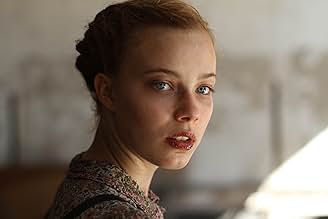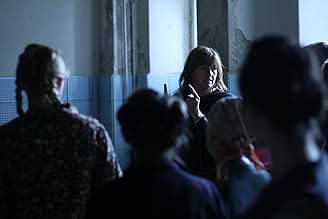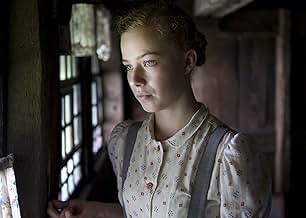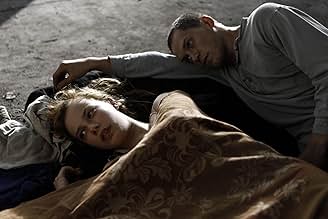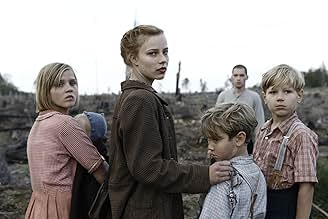Lore
- 2012
- Tous publics
- 1h 49min
NOTE IMDb
7,1/10
16 k
MA NOTE
Vers la fin de la guerre, Lore entraîne ses frères et soeurs dans un voyage qui leur dévoilera la vérité sur leurs parents. Une rencontre avec un mystérieux réfugié oblige Lore à faire confi... Tout lireVers la fin de la guerre, Lore entraîne ses frères et soeurs dans un voyage qui leur dévoilera la vérité sur leurs parents. Une rencontre avec un mystérieux réfugié oblige Lore à faire confiance à une personne qu'on lui a appris à haïr.Vers la fin de la guerre, Lore entraîne ses frères et soeurs dans un voyage qui leur dévoilera la vérité sur leurs parents. Une rencontre avec un mystérieux réfugié oblige Lore à faire confiance à une personne qu'on lui a appris à haïr.
- Réalisation
- Scénario
- Casting principal
- Récompenses
- 34 victoires et 34 nominations au total
Kai-Peter Malina
- Thomas
- (as Kai Malina)
Nick Holaschke
- Baby Peter
- (as Nick Leander Holaschke)
Claudia Geisler-Bading
- Ox Cart Woman
- (as Claudia Geisler)
Hanne B. Wolharn
- School House Woman 3
- (as Hanne Wolharn)
Avis à la une
Set in Germany at the end of the Second World War, this film takes up where others like Downfall leave off and asks questions about how the erstwhile beneficiaries of Nazi rule cope with their new world. The film tracks the journey of five innocents as their life of privilege collapses and they are forced to come to terms with the effects of dreadful events over which they had no control but to which they have given their tacit support.
Four of these children are really too young to bear any culpability. Only the oldest, Lore, is really capable of comprehension and it is through her eyes that the film is focused, as she slowly realises just how much her parents are implicated in the horrors of the Nazi regime, and, as an extension of this, herself and the whole German people. Lore is helped to this realisation by Thomas, a Jew who appears to have been liberated from a concentration camp. But Thomas also has a psychological burden and may not be all he appears.
This is another fine film from Cate Shortland, someone who surely should be making more films more often.
Four of these children are really too young to bear any culpability. Only the oldest, Lore, is really capable of comprehension and it is through her eyes that the film is focused, as she slowly realises just how much her parents are implicated in the horrors of the Nazi regime, and, as an extension of this, herself and the whole German people. Lore is helped to this realisation by Thomas, a Jew who appears to have been liberated from a concentration camp. But Thomas also has a psychological burden and may not be all he appears.
This is another fine film from Cate Shortland, someone who surely should be making more films more often.
The unusual thing about Lore is that, perhaps for the first time, we witness the devastation that Germany itself suffered as a result of World War II. And that was no little thing, something many are not aware or perhaps do not acknowledge.
As for the film, following the end of the war and specially the death of the one many Germans had come to think of as a saviour there is a sense of hopelessness and devastation.
In the family that the focus is placed, the mother has to entrust the safety and wellbeing of her children to her teenage daughter Lore. This mother had to flee for reasons that remained unknown.
What follows is that Lore had to abruptly grow up, without any training or warning and face a battle for survival as she heads to a place of safety. The film therefore is a chronicle of the journey undertaken by 4 children, led by a teenager, from a place of abandonment to a place of safety.
During this journey, they had to face the best and worst of human nature in their encounters with others. Some tried to help, whilst others only cared to take advantage of their predicament. An interesting scene was in the house of a woman who had a framed photo of the Fuhrer and said: Can you believe the lies they said about him? e only wanted to help? The endeavour got even more interesting when their paths crossed with a young Jewish man, who though seemed helpful the young lady in charge had to face a dilemma: In this difficult hour, do we get the help we desperately need from someone willing, or because I was brought up believing he is part of a filthy, inferior people I should just disregard him? The sexual tension between the two is also pivotal for the outcome of this adventure.
Furthermore, it seemed incomprehensible to this young person, how the country of superior people that was meant to lead the world is now occupied and divided into a Russian, American and British zones. He hear somewhere in the film: I am German and this is Germany.
A striking, sensitive film about growing up suddenly, the extreme sides of human nature and where the ultimate battle for survival can lead us to.
As for the film, following the end of the war and specially the death of the one many Germans had come to think of as a saviour there is a sense of hopelessness and devastation.
In the family that the focus is placed, the mother has to entrust the safety and wellbeing of her children to her teenage daughter Lore. This mother had to flee for reasons that remained unknown.
What follows is that Lore had to abruptly grow up, without any training or warning and face a battle for survival as she heads to a place of safety. The film therefore is a chronicle of the journey undertaken by 4 children, led by a teenager, from a place of abandonment to a place of safety.
During this journey, they had to face the best and worst of human nature in their encounters with others. Some tried to help, whilst others only cared to take advantage of their predicament. An interesting scene was in the house of a woman who had a framed photo of the Fuhrer and said: Can you believe the lies they said about him? e only wanted to help? The endeavour got even more interesting when their paths crossed with a young Jewish man, who though seemed helpful the young lady in charge had to face a dilemma: In this difficult hour, do we get the help we desperately need from someone willing, or because I was brought up believing he is part of a filthy, inferior people I should just disregard him? The sexual tension between the two is also pivotal for the outcome of this adventure.
Furthermore, it seemed incomprehensible to this young person, how the country of superior people that was meant to lead the world is now occupied and divided into a Russian, American and British zones. He hear somewhere in the film: I am German and this is Germany.
A striking, sensitive film about growing up suddenly, the extreme sides of human nature and where the ultimate battle for survival can lead us to.
Lore (2012)
A gorgeous, depressing, rare film about a family of Germans who need to survive the chaos and poverty of the end of World War II. This is a really terrific movie even though it has a single, basic, ongoing, sad arc--moving from place to place in search of food and safety as the Allies, mostly unseen, take over administration of the country in 1945. What it manages to say is not just that war is bad, or that people have the ability to survive anything if they must, but that beliefs and politics are stubborn and irrational.
It's this last part that comes through it all as the shining purpose. It's one thing for this band of children to beg for food or walk though forests weary and assaulted by marauders. But to have them run into others who, like themselves, don't know where to turn or what is going on, and still have a devotion bordering on worship for the fuhrer is mind blowing. But believable.
The filming--scenes, light, color, moving camera, and the sheer range of all of these from scene to scene--is stunning, absolutely terrific. As you might grow weary of all the weariness, you never grow weary of the movie because it's so rich in other ways. And it's never dull, either, as characters come and go and their motivations turn on a dime. How it ends, both literally and emotionally, will stay a surprise, and yet when it happens it makes such perfect sad undramatic sense.
There are all kinds of war movies, and this is an important insight into one of the least explored aspects to it all--the terrible aftermath. It's an Australian production, mainly, shot in Germany in German. And it's a really special, thoughtful, beautiful film.
A gorgeous, depressing, rare film about a family of Germans who need to survive the chaos and poverty of the end of World War II. This is a really terrific movie even though it has a single, basic, ongoing, sad arc--moving from place to place in search of food and safety as the Allies, mostly unseen, take over administration of the country in 1945. What it manages to say is not just that war is bad, or that people have the ability to survive anything if they must, but that beliefs and politics are stubborn and irrational.
It's this last part that comes through it all as the shining purpose. It's one thing for this band of children to beg for food or walk though forests weary and assaulted by marauders. But to have them run into others who, like themselves, don't know where to turn or what is going on, and still have a devotion bordering on worship for the fuhrer is mind blowing. But believable.
The filming--scenes, light, color, moving camera, and the sheer range of all of these from scene to scene--is stunning, absolutely terrific. As you might grow weary of all the weariness, you never grow weary of the movie because it's so rich in other ways. And it's never dull, either, as characters come and go and their motivations turn on a dime. How it ends, both literally and emotionally, will stay a surprise, and yet when it happens it makes such perfect sad undramatic sense.
There are all kinds of war movies, and this is an important insight into one of the least explored aspects to it all--the terrible aftermath. It's an Australian production, mainly, shot in Germany in German. And it's a really special, thoughtful, beautiful film.
Lore is an intense drama involving a period of post-WW II German society that is rarely if ever examined and to do it, as this film does, from the viewpoint of German children caught up in these tragic days is worth a visit just out of curiosity. However, this film does not just take a dispassionate look from the viewpoint of historian's or news print, rather because of the wonderful direction of Cate Shortland, this movie moves completely away from ordinary story telling into the far less examined area of psychological change.
Superficially this story is about a family of young children who are forced because of Germany's WW II defeat to make their way from the Black Forrest to their grandmother's home near Hamburg in northern Germany. The story concerns the time before that long journey, the incidents of that journey and finally their arrival at their grandmother's home. Sounds simple and straight forward but the devil, as they say is in the details, or rather the story.
As the story unfolds while the children attempt to reach the grandmother's home, the viewer explores through the eldest, who leads this group, many of the consequences of her past history as a child growing in this family with all the mental baggage implied by this maturation. The drama is carried by this eldest child, Saskia Rosendahl, to whom many of the film's incidents occur.
Moviegoers might be struck by the close-ups used by the director; most of the movie's shots are taken at that range and viewers may not like the method. It contributes to an extremely distinct film, along with the story as well as Rosendahl's superb acting, which must affect the viewer and this after all is why we attend movies to begin.
Superficially this story is about a family of young children who are forced because of Germany's WW II defeat to make their way from the Black Forrest to their grandmother's home near Hamburg in northern Germany. The story concerns the time before that long journey, the incidents of that journey and finally their arrival at their grandmother's home. Sounds simple and straight forward but the devil, as they say is in the details, or rather the story.
As the story unfolds while the children attempt to reach the grandmother's home, the viewer explores through the eldest, who leads this group, many of the consequences of her past history as a child growing in this family with all the mental baggage implied by this maturation. The drama is carried by this eldest child, Saskia Rosendahl, to whom many of the film's incidents occur.
Moviegoers might be struck by the close-ups used by the director; most of the movie's shots are taken at that range and viewers may not like the method. It contributes to an extremely distinct film, along with the story as well as Rosendahl's superb acting, which must affect the viewer and this after all is why we attend movies to begin.
An intense coming of age film set during an immense period of modern European history. Finding original stories related to the European theatre of World War Two is difficult, however this film brings an engaging and refreshing lens to the period.
The film focuses on the events at the end of World War II including the death of Adolf Hitler, the tracking down of the perpetrators of the Holocaust, the aftermath of camp survivors, and the territorial carve up of Germany. A time of lawlessness, starvation and depredation.
Within this historical period the film focuses on 5 children brought up as Hitler's Youth, who are on a journey to their Aunt's. The journey brings both physical and psychological challenges along the way for the children. Lore as the eldest child takes on the responsibility of guide, provider and parent. The historical events create the incredible physical tension in the film of a fallen 'utopia' with all of its personal dangers, violence, and hardship.
Along the way they encounter Thomas, a recently released from a concentration camp. The ensuing relationship between Lore and Thomas, which is part survival, part attraction, part revulsion and part adolescent, creates the psychological tension that is at the centre of the film.
The film has echoes of the Films Downfall of the Third Reich and Zentropa in its subject material. All three films by necessity are deeply intense psychological films. The end of the world as most in Germany new it and the incredible psychological changes that the ushering of an entirely new political, social and cultural regime brings. In my world it is almost impossible to imagine, but the children that lived through this are still alive, still with us, the living memories of that period of incredible turmoil. Fertile ground for story telling and film telling about our world and our society.
The film focuses on the events at the end of World War II including the death of Adolf Hitler, the tracking down of the perpetrators of the Holocaust, the aftermath of camp survivors, and the territorial carve up of Germany. A time of lawlessness, starvation and depredation.
Within this historical period the film focuses on 5 children brought up as Hitler's Youth, who are on a journey to their Aunt's. The journey brings both physical and psychological challenges along the way for the children. Lore as the eldest child takes on the responsibility of guide, provider and parent. The historical events create the incredible physical tension in the film of a fallen 'utopia' with all of its personal dangers, violence, and hardship.
Along the way they encounter Thomas, a recently released from a concentration camp. The ensuing relationship between Lore and Thomas, which is part survival, part attraction, part revulsion and part adolescent, creates the psychological tension that is at the centre of the film.
The film has echoes of the Films Downfall of the Third Reich and Zentropa in its subject material. All three films by necessity are deeply intense psychological films. The end of the world as most in Germany new it and the incredible psychological changes that the ushering of an entirely new political, social and cultural regime brings. In my world it is almost impossible to imagine, but the children that lived through this are still alive, still with us, the living memories of that period of incredible turmoil. Fertile ground for story telling and film telling about our world and our society.
Le saviez-vous
- AnecdotesThe family photographs in the wallet that Lore looks at are pictures of director Cate Shortland's husband's family.
- GaffesThe derelict tank the children pass in the forest is a post-WW2 manufactured Russian T-54/55 or T-62 tank. The balk cross painted on the turret is indicative of an early war paint scheme. Later in the war the 'lines' were thicker.
- ConnexionsFeatured in Film '72: Épisode datant du 13 février 2013 (2013)
- Bandes originalesJugend will marschieren
(Alte Aufnahme)
Folksong
Arranged by Lisa Carlyna Zumpano (ASCAP)
Published by Audiosparx (ASCAP)
Meilleurs choix
Connectez-vous pour évaluer et suivre la liste de favoris afin de recevoir des recommandations personnalisées
- How long is Lore?Alimenté par Alexa
Détails
Box-office
- Budget
- 4 300 000 € (estimé)
- Montant brut aux États-Unis et au Canada
- 970 325 $US
- Week-end de sortie aux États-Unis et au Canada
- 31 498 $US
- 10 févr. 2013
- Montant brut mondial
- 2 362 019 $US
- Durée1 heure 49 minutes
- Couleur
- Mixage
- Rapport de forme
- 1.85 : 1
Contribuer à cette page
Suggérer une modification ou ajouter du contenu manquant




